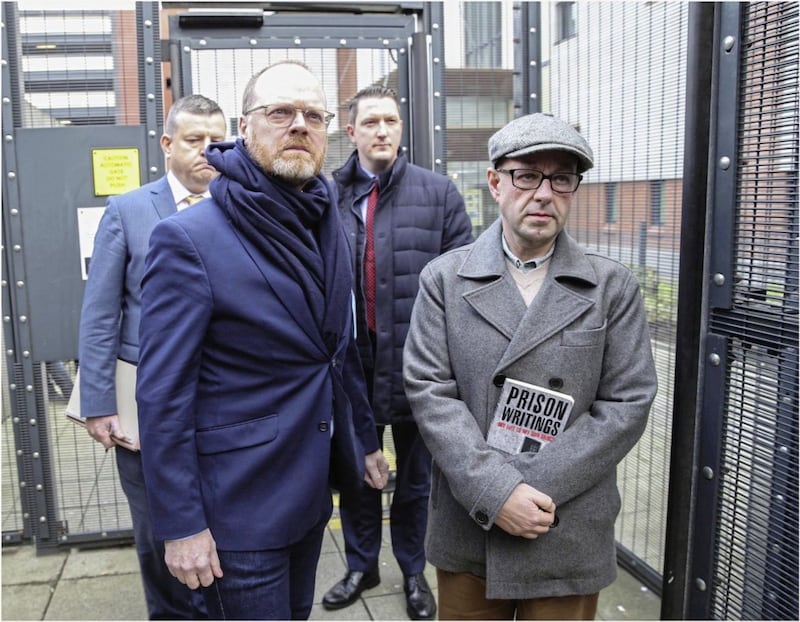Society here owes a debt of gratitude to Trevor Birney, Barry McCaffrey and their solicitor Niall Murphy (also solicitor for the families of victims of the Loughinisland killings) for the work they’ve done exposing collusion, corruption, malpractice and wrongdoing in the RUC.
Secondly, for what they have also done in the past six years to expose that, when it comes down to it, the PSNI behaves in many respects in a similar way to the RUC. Old habits die hard.
Their work centres on the mass killing in The Heights Bar in Loughinisland in June 1994, first with the documentary ‘No Stone Unturned’, and now with an important book by Birney, ‘Shooting Crows: Mass Murder, State Collusion and Press Freedom’.
There’s no need to repeat the details of the systemic, endemic collusion in the RUC in south Down. It is well known and attested. Dr Maguire, the Police Ombudsman, related how how the security forces “had been compromised, principally from the UDR but also within the local RUC, through either direct involvement with loyalist paramilitaries, associations or sympathies”.
The police knew full well the members of the local UVF murder gang but allowed them to continue killing with impunity, not just in south Down but in Belfast too.
The police chose to use them as informers but, as elsewhere, that calls into question the purpose of informers if they’re not to prevent murder. Unless of course, as often happened, if elements in the security forces decided who they were allowed to kill.

South Down, thanks to Birney and McCaffrey, is only the best and most extensively documented example of what was going on across the north.
The added travesty is that, despite the Heights Bar killers being widely known, and not only to the police, the only people who have ever been arrested in connection with the murders are two journalists.
Here we come to the second part of the debt owed to these men. Their treatment exposed that the PSNI, over the two decades-plus of its existence, has doubled down on protecting the wrongdoing and collusion of the RUC.
The extraordinary lengths members of the PSNI went to in order to frustrate Birney and McCaffrey’s efforts to uncover the truth about Loughinisland provide irrefutable evidence of the PSNI’s relentless quest to hide the RUC’s sins. Why? Is it not supposed to be a new police service?

In countless cases alleging collusion and cover-up going back 50 years, the PSNI has denied, delayed and obstructed justice for relatives. Wasting hundreds of thousands of public money, the PSNI has appealed court decisions up to the Court of Appeal. So if they lose, well, at least they’ve delayed an inquest a few months longer.
They invoke national security and request Public Interest Immunity certificates. National security? Give us a break. For events 50 years ago when surveillance techniques were totally different? No, it’s to hide informers and collusion.
Eventually lawyers are contemptuously handed a version of a PII heavily censored by the PSNI, deliberately useless. In one case Niall Murphy was handed a PII consisting of a completely blacked-out folder.
Even more worrying is the PSNI continuing the RUC practice of blanket surveillance and snooping. Again, thanks to the persistence of Birney, McCaffrey and Murphy, we have now seen the tip of the iceberg at the Investigatory Powers Tribunal.

Already the PSNI had to disclose to the paper tiger Policing Board that they’d monitored over 4,000 communications of a dozen journalists over one three-month period. They also admitted they had made 823 applications for communications data for journalists and lawyers over a 13-year period from 2011-24 and snooped on McCaffrey for a decade.
It’s difficult to know which the PSNI thinks is the bigger threat to society, journalists or lawyers, given the amount of effort they expend trying to frustrate them carrying out their indispensable functions.
Then again, it’s pretty clear from their actions in arresting Birney and McCaffrey that the PSNI don’t share the European Convention position that the work of lawyers and journalists is indispensable.
- ‘The police don’t arrest journalists just for doing their job. Do they?’ - Shooting Crows: Mass Murder, State Collusion and Press FreedomOpens in new window
- Noel Doran: Loughinisland and the long shadow of collusionOpens in new window
- ‘Forget ‘fake news’, Shooting Crows is about what governments do to journalists when they tell the truth’ - Trevor Birney on new Loughinisland massacre book, legal vindication and the runaway success of the Kneecap movieOpens in new window
Elsewhere the behaviour of the PSNI is rightly regarded as abhorrent. A lengthy article in The New Yorker about their behaviour expressed astonishment at such snooping and surveillance.
What all this scandalous behaviour calls for is root and branch reform of PSNI governance and a substantial increase in powers and finance for the Police Ombudsman.
The Conservatives maliciously cut the PONI budget to ribbons so that the office can’t do its work any more. The task for the new proconsul is to restore the situation as it was when Labour left office in 2010.
Next, how do you get the PSNI to act as servants of the people? Some hope.




